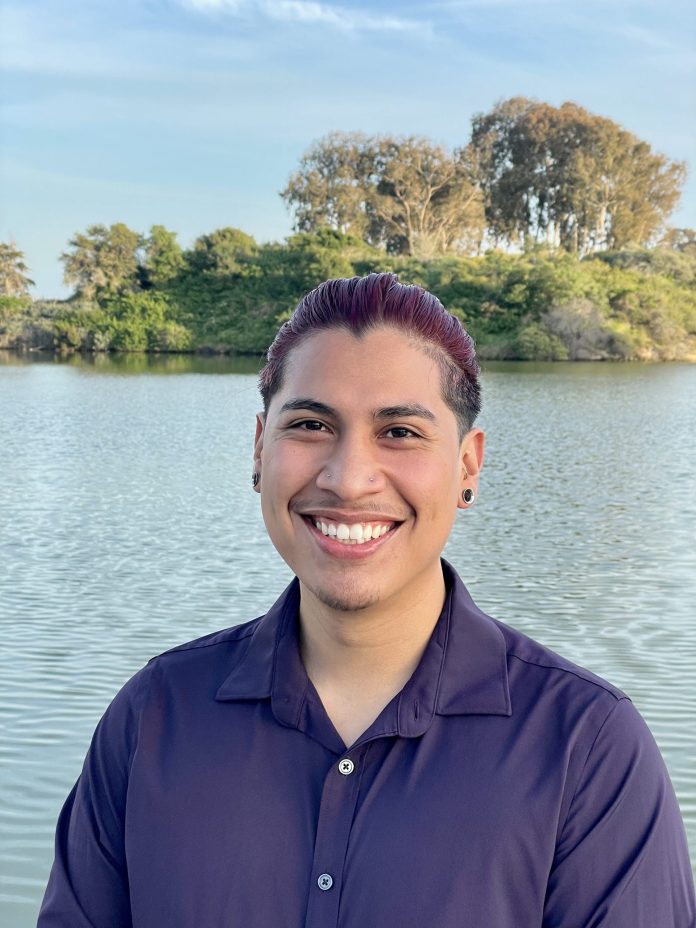Han Do
AS Beat Reporter
Geovany “Geo” Lucero spent much of their college years advocating independently for themselves and UC Santa Barbara (UCSB) students across the board. Taking office means they now have the power to do more, but first they have to ensure their voice gets heard.
Before becoming the Student Advocate General (SAG), Lucero, a fifth-year feminist studies major, has kept themselves busy. At UCSB, Lucero was involved with the Associated Students (AS) for the past three years and was also a part of the Trans and Queer Commission, the Pride Committee, and the MultiCultural Center Council. Lucero now runs the Office of the Student Advocate (OSA), the newest on-campus office created around 2009, out of the need to inform students of their legal rights and the aid available to them in other legal processes.
The Bottom Line (TBL) sat down with Lucero to learn more about the OSA and their plans to utilize this office in the upcoming future.
The OSA is a non-partisan executive office that helps students with situations involving disputes either with other students, organizations, or the university.
“[It felt like] there wasn’t really anybody on campus that had the responsibility to ensure students were aware of their rights,” Lucero said, “that they understood university policies and that they had somebody to defend them or advocate for them.”
Lucero took office amidst the COVID-19 pandemic and tensions between online and in-person instruction. As the SAG, they want to make sure students are aware of the useful services their office offers.
The OSA office has three divisions: academic and financial aid, conduct, and grievances.
Academic and financial aid cases range from grade disputes and appeals to being on academic or financial aid probation. Examples of other cases that could be handled by the OSA include getting reported for a noise violation (conduct case), feeling like you’re being targeted by a professor, or experiencing discrimination by any organizations or entities (both grievances cases).
Lucero explained that if a student doesn’t know how to submit an appeal, the office can assist them with the process.
“My biggest idea, the standard for my office this year, is making sure that students don’t ever feel like they have to go through any process alone,” said Lucero.
These services are free and confidential, and no information leaves the office without student permission, outside of mandated reporting (such as Title IX).
Since being elected as SAG, Lucero has worked to implement numerous changes.
For example, they started a Return to Campus Survey, which was sent out at the beginning of winter quarter and got over 4,000 responses. This data helps prompt their office’s regular meetings with UCSB’s COVID-19 medical team and the administration to discuss the return to campus.
“I used that data to articulate a plan I felt would be best for our campus and students,” Lucero told TBL.
In addition to establishing new policies minimizing police presence at Isla Vista events, their office also collaborated with the University of California Police Department (UCPD) to include trigger warnings to UCPD announcements of local incidents and crime, the details of which can be disturbing at times.
“We had many conversations with the Isla Vista Foot Patrol Agency, the UCPD, the administration, and the UCSB Division of Student Affairs to give students the agency to decide for themselves whether or not they wanted to read those kinds of reports,” Lucero told TBL.
As to what’s in store for the future, Lucero revealed that their office will be launching its own police complaint form, the first and only non-police-owned or mediated complaint form that students have access to.
“Right now, you can [only] go in person to a police station and say, I want [to file] a complaint against one of you, which is contradictory,” said the SAG.
The new complaint form will be processed with the OSA. There, the office will compile all the complaints and give an annual report to the university and other entities, such as the Police Advisory Board.
In regards to the housing crisis, their office is currently working with the AS Basic Needs Committee and looking into purchasing water filters for students who currently live in hotels, so they have access to clean and safe water.
However, progress is not without its challenges. Lucero doesn’t think that their office has been able to “really plant itself into the university” just yet.
“The biggest struggle was folks being kind of like ‘why do you belong here?’” Lucero said.
Their job certainly involves a lot of communication and demands which can be difficult to juggle at times. Lucero recalls a “few harsh conversations” with themselves over the need to uphold their personal standards and work ethics but also care for their own wellbeing.
Ultimately, their position is about challenging university policy and implementing new ones. However, at this point, there are boundaries that have yet to be tested.
“I will say that it requires a really hard attitude, which I am more than happy to provide. And it requires a lot of patience too,” said Lucero.











